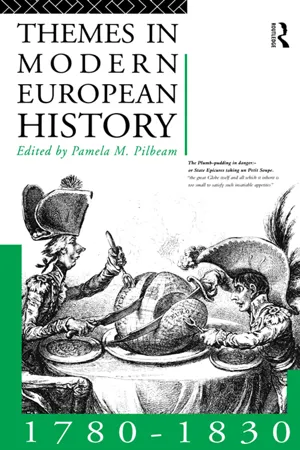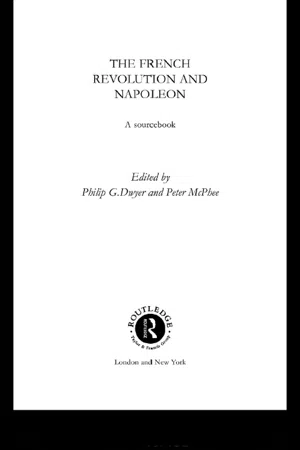History
Assembly of Notables
The Assembly of Notables was a gathering of high-ranking nobles and clergy in France, convened by the king to seek their advice and consent on important matters. These assemblies were used during the Ancien Régime to address financial and political issues, and they played a role in the lead-up to the French Revolution.
Written by Perlego with AI-assistance
Related key terms
4 Key excerpts on "Assembly of Notables"
- 6For what now seem more principled and public-spirited motives than was once thought, that assembly had been unwilling to approve the Crown's specific proposals to tax the privileged orders on a more regular basis, and such reforms had of course come only with the Revolution. The legal distinctions between the old social orders, that is between official privilégiés and commoners (the great mass of what had been the third estate), had been outlawed in principle as early as the Declaration of the Rights of Man and of the Citizen on 26 August 1789. On 19 June 1790 the Constituent Assembly had abolished nobility, as such, along with all its titles and outward trappings. These reforms, first achieved under the constitutional monarchy, had then been assimilated as part of the stock-in-trade of republican rhetoric, for instance in the constitutions of both 1793 and 1795. Under those constitutions, in short, the whole concept of ‘notability’ had become a sort of political anathema, and all terms denoting it had disappeared from the official language of ‘citizenship’ propagated during the Revolutionary Republic.The reappearance of the concept of ‘notability’ in the public life of the Consulate no doubt testifies to Napoleon's hierarchical view of French society, but it may also obliquely reflect the superficiality of egalitarian rhetoric during the Revolutionary decade. On the other hand, ‘notability’ had lost the highly exclusive meaning it had had under the old regime, and its nuances changed again as Napoleon increasingly imposed his will on the official forms of his regime. The earliest lists of the Consulate, those drawn up in accordance with the Ventôse law of the Year IX (4 March 1801), in fact referred to ‘notabilities’ in all the departments of the French Republic. These lists reveal a predominantly official element, made up mainly of men employed in local administration and the legal services, and they were unmistakably republican in character. Their very composition was to a certain extent preordained, since some of the incumbent personnel not only appeared on the lists ex officio but could also use such influence to job in many others of their own sort. They included local officials of the Directory who had adjusted their careers to the new political circumstances after Brumaire. The next most numerous group were generally described as ‘landowners’ (propriétaires
- Louis Adolphe Thiers, Frederick Shoberl(Authors)
- 2016(Publication Date)
- Normanby Press(Publisher)
tiers-état still had the advantage; for, in opposition to the forms of 1614 demanded by the higher orders, forms yet more ancient were adduced. Thus, in certain assemblies, and on certain points, the members had voted individually; sometimes they had deliberated by provinces, not by orders; frequently the deputies of the tiers had equalled in number the deputies of the nobility and clergy. Why then refer to ancient usages? Had not the powers of the state been in a continual revolution? The royal authority, at first sovereign, then vanquished and despoiled, raising itself again with the aid of the people, and again uniting all the powers in its own hands, exhibited a perpetual conflict and an ever-changing position. The clergy were told that if they were to take ancient times for their standard they would cease to be an order; the nobles, that the possessors of fiefs only were qualified to be elected, and that thus most of them would be excluded from the deputation; the parliaments themselves, that they were but unfaithful officers of royalty; lastly, all were assured that the French constitution had been but one long revolution, during which each power had successively predominated; that everything had been innovation, and that amid this vast conflict it was for reason alone to decide.The tiers-état comprehended nearly the whole nation, all the useful, industrious, enlightened classes. If it possessed but a portion of the lands, at least it wrought them all; and, according to reason, it was not too much to allow to it a number of deputies equal to that of the two other orders.The Assembly of Notables declared itself against what was called the doubling of the third estate. One of the government officers, that over which Monsieur, the king’s brother, presided, voted for this doubling.{8} The court, then, taking, as it said, into consideration the opinion of the minority, the sentiments expressed by several princes of the blood, the wishes of the three orders of Dauphiné, the demand of the provincial assemblies, the example of several countries of the kingdom, the opinion of various public writers , and the recommendations contained in a great number of addresses—the court ordained that the total number of the deputies should be at least a thousand; that it should be formed in a ratio composed of the population and the amount of taxes paid by each baillage , and that the number of the deputies of the tiers-état- eBook - ePub
- Pamela Pilbeam(Author)
- 2012(Publication Date)
- Routledge(Publisher)
Not only did they refuse to rubber-stamp his policies, but they even began to question his integrity, comparing the massive deficit of 1787 with the surplus reported by Necker in his compte rendu of 1781. Calonne replied with a direct appeal to the people in the form of the avertissement read from the pulpits in April, accusing the notables of defending their own selfish interests. It was a last desperate gamble and it failed; on 8 April 1787 he was dismissed. His replacement was one of his chief critics, Lomenie de Brienne, a worldly archbishop strongly suspected of atheism. Brienne was as skilled in intrigue as he was ill-versed in finance, and Louis was obliged to correct his minister’s sums before a new fiscal package could be presented to the notables. With extra taxation the only realistic option available, Brienne could only add a new gloss to Calonne’s original programme. Not that it mattered. The Assembly proved no more amenable than before, and on 25 May it was dismissed. The crown was now forced to employ its traditional strategy of registration in the Parlement of Paris. Since 1756, it had been common practice to impose unpopular taxation at a lit de justice, where the king presided in person. After the ceremony, the parlementaires would protest about the insult to the fundamental laws of the kingdom and arbitrary government, while the crown collected its taxes. By summoning an Assembly of Notables, the king had refused to play by these old rules, and in July and August 1787 the Parlement did the same. Not only did it declare the forced registration of Brienne’s edicts to be illegal, but it also echoed the notables by calling for the convocation of the Estates General. The ancient representative body of the nation had last met in 1614, but according to the government’s critics it was the only body qualified to grant new taxation - eBook - ePub
The French Revolution and Napoleon
A Sourcebook
- Philip Dwyer, Peter McPhee(Authors)
- 2002(Publication Date)
- Routledge(Publisher)
Sire, the State is in danger; your person is respected, the virtues of the monarch ensure the homage of the nation; but Sire, a revolution is brewing in the principles of government; it is being brought on by the ferment of opinion. Reputedly sacred institutions, which this monarchy has made to prosper for so many centuries, have become matters for debate, or are even described as injustices.The writings which appeared during the Assembly of Notables, the reports which have been delivered to the undersigned princes, the demands put forward by various provinces, towns or corporations; the objectives and the style of these demands and these reports: everything proclaims, everything reveals a system of deliberate insubordination and contempt for the laws of the State. Each author sets himself up as a legislator; eloquence or the ability to write, even when devoid of study, knowledge and experience, seems to be sufficient to determine the constitution of empires: whoever puts forward a daring proposition, whoever proposes to change the law, is sure of having readers and an audience.Such is the unhappy progress of this agitation that opinions which a short time ago might have seemed reprehensible, today appear to be reasonable and fair; and that which good people are indignant about today will in a short time perhaps pass as regular and legitimate. Who can say where the recklessness of opinions will stop? The rights of the throne have been called into question; the rights of the two orders of the State divide opinions; soon property rights will be attacked; the inequality of fortunes will be presented as an object for reform; the suppression of feudal rights has already been proposed, as the abolition of a system of oppression, the remains of barbarism….
Learn about this page
Index pages curate the most relevant extracts from our library of academic textbooks. They’ve been created using an in-house natural language model (NLM), each adding context and meaning to key research topics.

![The History of the French Revolution Vol I [Illustrated Edition]](https://img.perlego.com/books/RM_Books/inde_pub_group_sqonxaw/9781787202801_300_450.webp)

